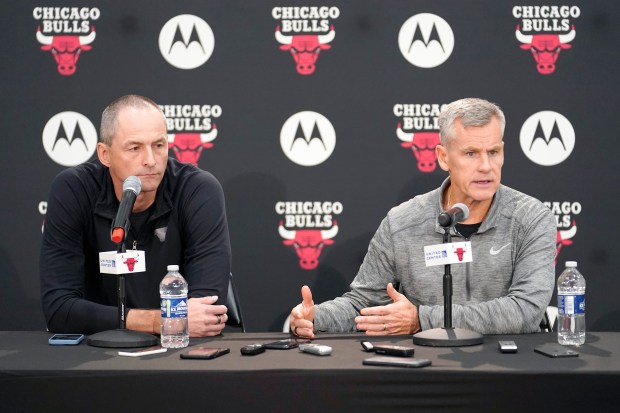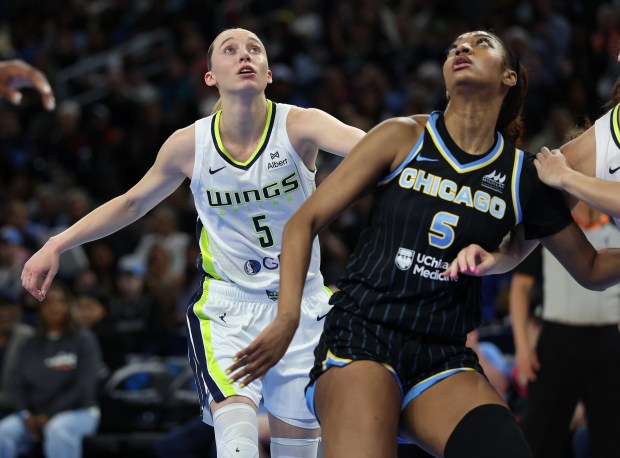The NBA season picks up with an urgency after the All-Star break — and the Chicago Bulls were well aware of that impending pace when they entered the five-day break last week.
The Bulls will have 27 regular season games to defend their play-in standing and attempt to sneak up into a playoff position. With a 26-29 record, the Bulls are currently ninth in the Eastern Conference and sit 4 1/2 games back from a playoff spot (sixth in the conference).
One advantage for the Bulls will be strength of schedule, as they face the ninth-easiest schedule in the East — and the 17th-easiest in the entire league — after the break. Their main hurdles will be two games against the Boston Celtics — including Thursday’s return to action — and three games against the New York Knicks.
Here are five questions the Bulls must focus on during this final stretch of the season:
1. Are there any worthwhile options on the buyout market?
This is the most immediate concern for executive vice president of basketball operations Artūras Karnišovas and the Bulls front office.
The buyout market — when teams grant free agency to players after the trade deadline for cash considerations — is always a hit-or-miss mechanism to bulk up the supporting cast for a final run toward the playoffs. But Karnišovas has been fond of making buyout moves over the last two seasons — and the Bulls have an empty roster spot, making this an easy option if the front office feels any gaps in the roster need at least a stopgap.
This decision will likely be influenced by the timeline for Patrick Williams to return to the court after being sidelined for two weeks leading up to the All-Star break with a bone edema in his left foot. If the forward can return quickly — even potentially by Thursday’s game against the Celtics — the Bulls might feel comfortable working with what they’ve got for the rest of the season. But without Williams, the Bulls have struggled against lengthy teams.
2. How much responsibility is Coby White ready to carry?
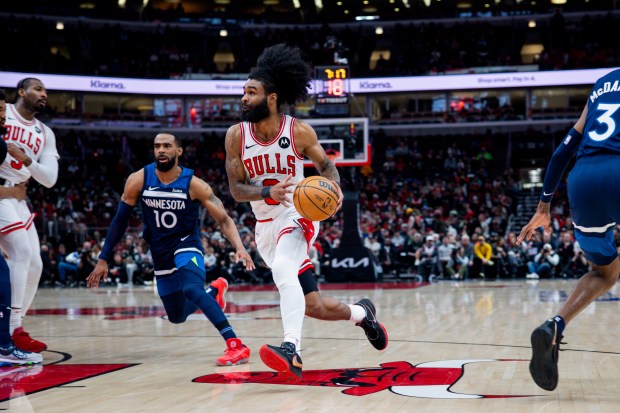
A big picture quandary — and one that has already defined this season. White has stepped up in every way this year, throwing his name into the ring for Most Improved Player while helming the Bulls offense and rattling off the most productive season of his professional career.
Over the past month, the Bulls have been studying one particular question: Is that growth enough to make White the go-to guy in must-win moments?
Typically, DeMar DeRozan is the player the Bulls want with the ball in his hands in closing situations. But opposing teams know that and it makes the defensive opposition incredibly difficult when the Bulls don’t have a secondary option for those clutch moments. White has been handed more responsibility in recent clutch games, including a loss to the Cleveland Cavaliers in the final game before the All-Star break.
For coach Billy Donovan, the next step of this evolution is figuring out when to go to White, when to go to DeRozan and when to leave that decision up to the players.
3. How much usage should the two-big lineup be given down the stretch?
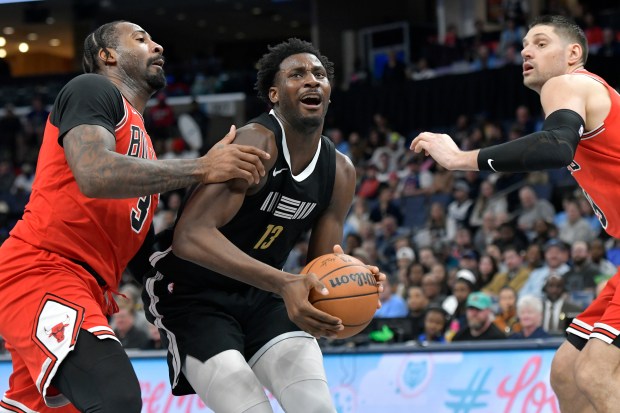
Donovan was forced to utilize the towering lineup of Andre Drummond starting alongside Nikola Vučević this season. But so far, the emergency measure has been a solid success for the Bulls, with both Vučević and Drummond thriving in this larger set.
Donovan highlighted the two-big rotation as a key focus for the team coming out of the break. He plans to run the team through a higher volume of reps with Drummond and Vučević in practices this week to create familiarity for the entire roster with both bigs on the floor. Donovan noted the centers have been comfortable and adaptable in the rotation, but the main difficulty for the Bulls is spacing the rest of the guards in this unique look.
If Donovan is committing those reps to this rotation, it will likely receive a hefty amount of play down the stretch. What the coach will have to determine on the fly is when the rotation makes the most sense for the team — and how to adapt to whatever counter-rotations opposing teams use in return.
4. Is it time to re-sign DeMar DeRozan? What about Patrick Williams?
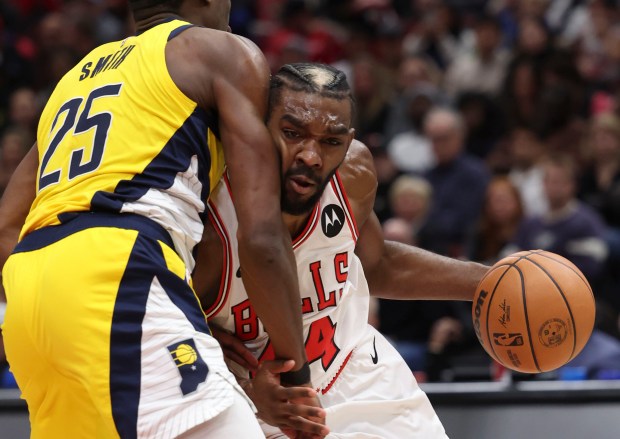
Chicago Bulls forward Patrick Williams drives into Indiana Pacers forward Jalen Smith on Thursday, Dec. 28, 2023, at the United Center. (Brian Cassella/Chicago Tribune)
Technically these are two questions better suited for the summer. But the Bulls have to use the upcoming 27 games of the regular season — plus whatever time they’re able to snag in the postseason — to assess their plans for negotiating contracts with two players in markedly different places, both with the Bulls and in their careers.
DeRozan is beloved by teammates, coaches and executives in Chicago. He earned All-Star nods in his first two seasons with the Bulls, adjusted his game to a different team ethos this season and has commanded the identity of the Bulls locker room throughout his time with the team. It’s clear why the Bulls would want to bring him back next season — but the team has yet to re-sign DeRozan to an extension, which could top out at a four-year, $179 million contract.
The Bulls front office is unlikely to meet that salary maximum to keep DeRozan, despite how deeply they value him as a player and a leader. So they need to set their number — and build a solid pitch to DeRozan’s camp, which will be weighing whether it’s worth it to stay in Chicago at a lower price tag.
Williams is in a different position. He’s never lived up to the expectations of his No. 4 overall draft selection in 2020, but the forward has still grown as a consistent defender and 3-point shooter. While injuries have caused another setback this season, Williams played all 82 games last year, showing improved physical resiliency after struggling with injuries throughout his first two seasons.
The Bulls have remained optimistic that Williams can continue to improve his production in Chicago. But as Williams hits restricted free agency this summer, the front office will have to weigh that optimism against the reality of their roster management to make a final decision — extend a nearly $13 million qualifying offer or risk letting the young forward walk.
5. What defines “success” for this team?
Another big-picture doozy. The Bulls front office has defined success in many ways over the last three years: win more games than the previous season, finish over .500, make the playoffs and stay competitive.
The Bulls might accomplish a few of those things this year. The .500 threshold has remained just out of reach for most of this season, but it’s reasonable to expect the team to pick up 14 wins over their final 27 games to either match or improve upon last year’s 40-42 record. They should be set for a play-in spot and could still wiggle their way to the playoffs through that tournament.
So what does that mean? Some parts of this season have been successful, most notably the unexpected ascension of White and the continued growth of Ayo Dosunmu. But with Zach LaVine injured and impossible to trade, the Bulls appear to be rudderless.
Maybe a trip to the playoffs would change that perception. Most likely not. What the Bulls front office will have to determine after this season is how to build upon the minimal success of this season.


